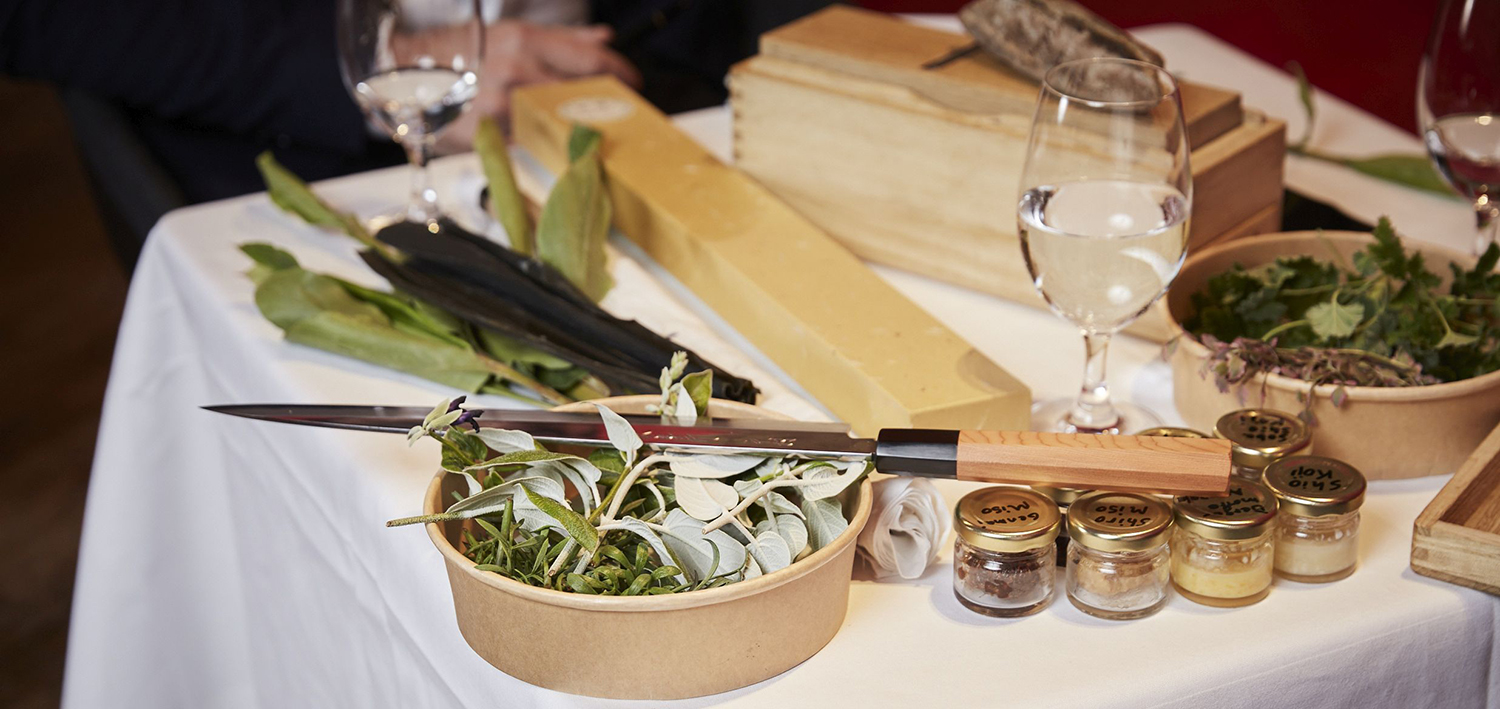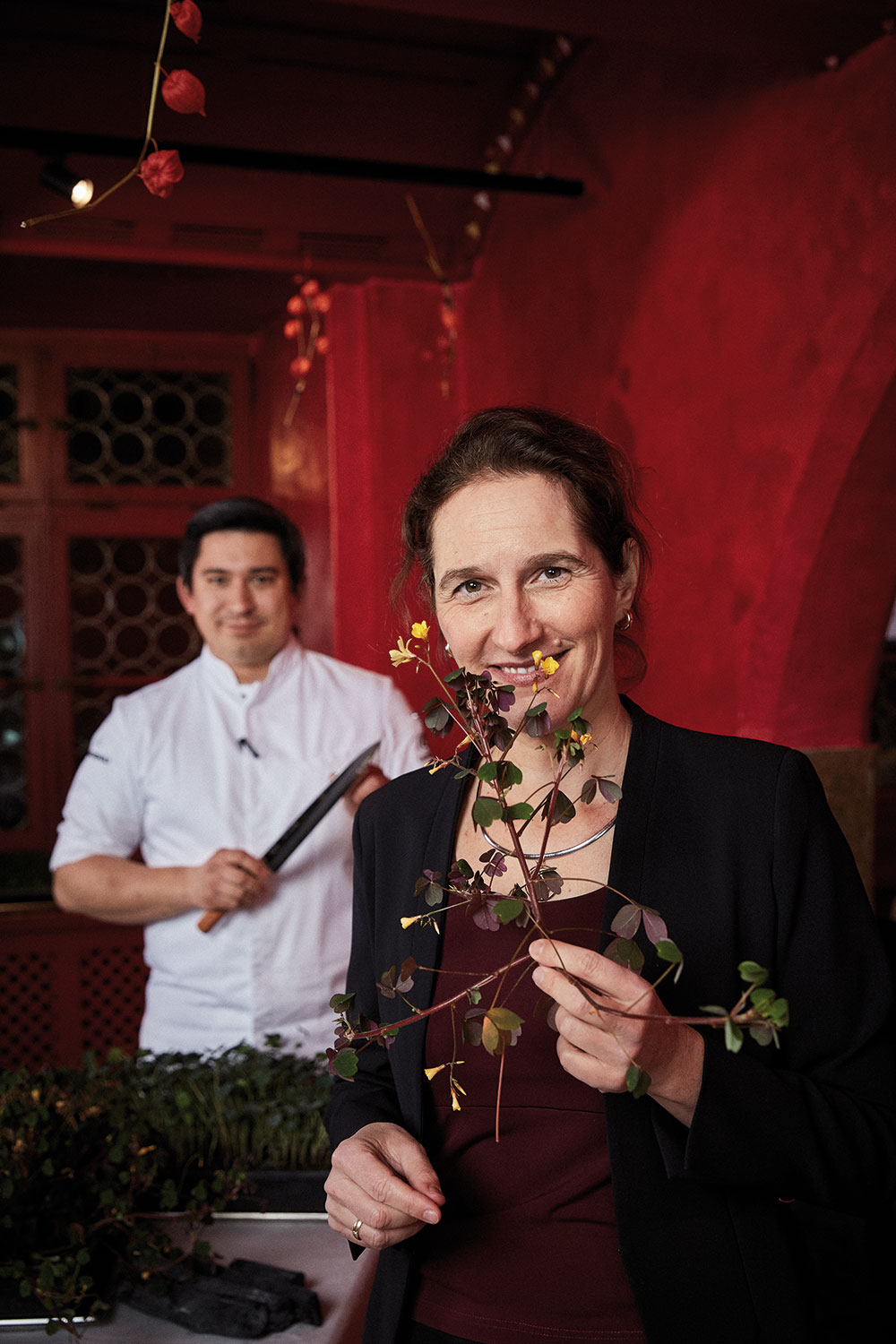Research & Cuisine
How do you envisage a world without aromas?
Büttner: Frightful! I once lost my sense of smell because of an infection − I was full of dread! Mr. Nakamura, as a chef you are presumably just as anxious over your olfactory epithelium.
Nakamura: Indeed. Early last year, I lost my sense of taste completely − fortunately I tested negative for Covid. In my profession, this is just like a skier breaking his leg. But for restaurant clientèle too, there’s no pleasure without a sense of smell. Their passion disappears. They no longer have a subjective experience. After all, we associate so many aromas and fragrances with our subconscious!
What is your first memory of a scent as a child?
Nakamura: The fragrance of Nabe, this Japanese hotpot. With dashi, the classic broth made from kombu algae and bonito dried fish, vegetables and tofu added in, the delicate essence of soya beans − all simmered together in the middle of the table, with the smell of the log fire burning in our fireplace to boot: The nose evokes memories like these in all of us. We build ourselves a world around them. All the important things in life involve smelling, eating and drinking. Without this direct association, days on which we would normally celebrate are not so easy to recall. Ascension day? No idea. Christmas then? Of course. Roast goose? Ditto.
Ms. Büttner, which childhood memory does a particular scent evoke for you?
Büttner: My Dad was a carpenter, actually quite a famous one — he made the bed and the swing ship for the fictional character Pumuckl. I played in the wood shavings. My bedroom was all stone pine. This has always been an unbelievable scent for me. Incidentally, we are analyzing wood odors at my Fraunhofer Institute at the moment. It’s astonishing how little we know about them. We are constantly discovering new aromas that the world has no idea about. I am always delighted when we are able to synthesize them − suddenly, you are standing in a cloud of scent that nobody else has ever experienced before.
About 15 percent of people have no sense of smell, or a very poor sense of smell. How many of them are taste dyslexic, so to speak?
Büttner: Many, an alarming number. And it’s not only a coronavirus issue. Other infections could also harm our sense of smell and taste: Alzheimer’s, Parkinson’s, neuro-degenerative diseases, including the aging process in itself − the quota is astonishingly high. In our institute, therefore, we do more than just investigate aromas, we analyze people too. We take individual aromas and test the variance. You would be shocked if you saw the difference in people’s thresholds for smell detection, these thresholds can be many powers of ten apart.
Nakamura: When I cook for 30 guests, each and every one of them has a different perception. And yet evening after evening, we are met with a basic consensus in our restaurant − and everyone has a joyful culinary experience.
Büttner: Fascinating.
Nakamura: The question remains though − how can we steer this towards an even more dependable result? How much of the effort we make behind the scenes do our guests actually perceive: In terms of taste, appearance, sound? How crispy should things be? How should they sound as we eat them? We have so many variables, so many unknowns!

What do you think you can learn from the research Ms. Büttner is doing?
Nakamura: A great deal. Our kind of cuisine thrives on consistency. It’s incredibly important that we not only create the sensual, the emotional, the pleasure for our guests, but that we can keep reproducing these moments too. And so we do need to ask ourselves: Which multi-sensory effects can we use to put our guests even more at ease and to make sure they leave with a long-lasting memory of an even more positive experience. The fragrance in the room, the aromas from the dishes − I believe that we in gastronomy are still at the very early stages here. And I am sure we can learn much more in the award-winning kitchen of science.
Büttner: Welcome to Fraunhofer! I’m plagued by questions like these right now: How will we achieve safe and enjoyable cuisine in the post-corona period? It will require more than creating a healthier indoor climate. We also have to look at air conditioning and air circulation systems, aerosol dispersion, proactive hygiene, disinfection and decontamination, odors and the cleanliness of interior surfaces, kitchen utensils and the items we use to serve food such as crockery, glasses, table settings and much more as everything interacts. But how will this affect our sensory perception? I do not believe that people really understand that there’s only one ideal temperature to get the perfect enjoyment from certain dishes. In our team, there are also psychologists and neuroscientists − a broad range of disciplines actually − working on such issues. And many are drawn to the main topic of multi-sensory integration processes.
Mr. Nakamura, if we were to break down enjoyment into molecules and aroma into individual components, do you think we are destroying the magic?
Nakamura: On the contrary − this would be very exciting for us in gastronomy. We too need to understand and be able to explain what we do and how we can best entice our clientèle. For all the technical consideration, what ultimately remains is the emotion — I might know it’s all just molecules, but I still feel the magic at the end.
Ms. Büttner, you are working on pushing the boundaries of technical sensors.
Büttner: And not just that ... the human being is a multi-sensory system with all their strengths and weaknesses. In parallel, we are developing the multi-sensory aspects of technical systems too. It’s elementary for us to understand the weaknesses of humans as well as the technical systems. In the vast majority of cases, simply building a sensor that can detect smells does not make sense. We sometimes need a few tricks up our sleeves as well. Let’s take an example: When we conch chocolate, we all want to find that perfect time at which acid and unpleasant and astringent tasting notes disappear, but the desired aromas remain or intensify and the optimum balance of bitterness, sweetness and sense arrives on the palette. Many of us would like to have an electronic nose that can reliably determine the optimum point. It can be far more practical to observe the chocolate mass during the conching process and have an optical or mechanical sensor indicate when this time has occurred. And although there are many who would like to solve the problem using artificial intelligence, what we really need is the human mind, an understanding of the basic process and of what makes most “sense”.
Ms. Büttner, you are developing new foods and seeking alternatives to meat. You grew up in Maxvorstadt in Munich. How do you like roast pork?
Büttner: I love it! But the crackling has to be perfect. If we’re having meat, let’s have good meat! And of course excellent dumplings.
Mr. Nakamura, could you imagine your kitchen without meat?
Nakamura: In my kitchen, we have the same quality expectation of a beetroot as we do of a fillet steak − essentially, then, the answer is yes. No fish, however, would be a different matter. A kitchen without dairy products would be very, very difficult. And without any eggs? These items simply play a monumental role in the kitchen. Incidentally, I eat very little meat personally. So the idea of wanting to recreate meat from plant-based raw materials is a difficult one for me to understand. So this vegetarian mincemeat burger ...
…is the work of the devil for you?
Nakamura: Let’s say it goes beyond my culinary powers of imagination at the moment. But I do admit: 20 years ago, I could not have imagined a smartphone either.
You do believe, then, in technical advancements in the food world?
Nakamura: I find food from insects extremely exciting, because this source of protein could solve many of mankind’s problems. Perhaps we just need to skip a generation. We are not quite that rational: Why do we splash out so much on a lobster, while many people find grasshoppers simply abhorrent?
Büttner: We are currently working on the KERBSE project. This is a Camembert from pea protein.
Mr. Nakamura, I can see you cringing a little there!
Nakamura: As a chef, I tend to go for the most natural products, the ones created with the most care. I like to do business with those farm producers who pour passion and appreciation into making the things that impress us. The pea Camembert sounds rather like painting by numbers.
Büttner: You shouldn’t view this as an either/or situation. We’re simply seeking to unlock additional sources of food.
Nakamura: You are right there. We have to differentiate between haute cuisine and our day-to-day diet, which might have us eating a high proportion of meat and animal products, often unwittingly.
You’re making me very curious, Mr. Nakamura. Your first Michelin star in 2013, a second Michelin star in 2016, two-time “Chef of the Year”, ambassador of Japanese cuisine since 2020”: What does this man cook on an average day in his kitchen at home?
Nakamura: First of all I have to say − I love to cook, even when I’m at home and not working. Once a week, I need conventionally cooked Japanese rice for my inner harmony, otherwise my yin and yang are out of balance. Served with a generous helping of vegetables. Of course, it’s easier to come by good quality vegetables than good quality meat or fish.
What would be your advice when speed is of the essence?
Nakamura: Toast some bread, pop a wedge of vacherin in the oven, add a salad −and there you have a superb dish. Just on that, Ms. Büttner, do you see a way of transferring the aroma we get from a tomato vine to the fruit itself? We know they are toxic, of course, but the fragrance...
Büttner: A scientist at our institute has just found from an analysis that tomatoes retain their taste better if they arrive at the shop on the vine. I’m confident we can answer to your question too.
Ms. Büttner, Mr. Nakamura, thank you very much for talking to us. Before my very eyes, I am seeing the third Michelin star unfold for Mr. Nakamura in the interplay between the practice and the theory of enjoyment.
- Fraunhofer Institute for Process Engineering and Packaging IVV (ivv.fraunhofer.de)
